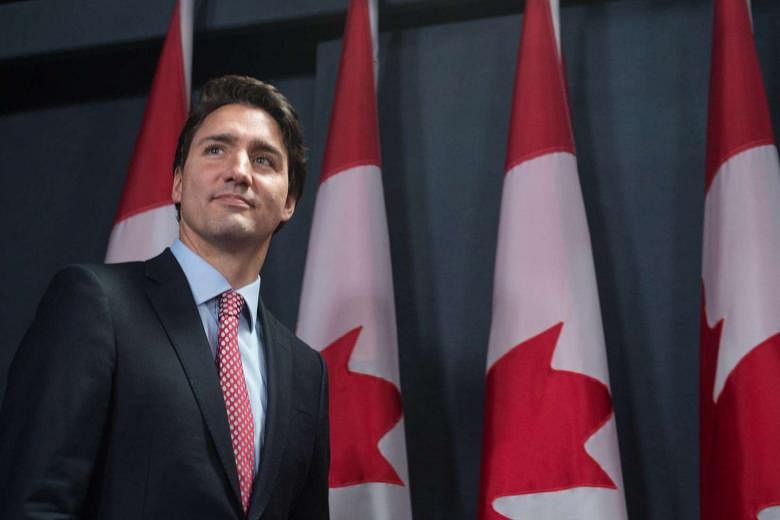OTTAWA • Mr Justin Trudeau takes over as Canada's Prime Minister with dramatic action at home - by naming an equal number of men and women to a Cabinet cut from 39 to about 25 - and by stepping onto the international stage with a fortnight of back-to-back summits leading to the United Nations climate talks in Paris.
Mr Trudeau, the first son of a prime minister to take office in Canada and the second youngest in the country's history at 43, has grabbed attention for his good looks and crowd-loving approach.
His swearing-in ceremony yesterday ended a decade of Conservative rule under Mr Stephen Harper, whose party is searching for a new leader.
Critics have already questioned the pledge for a gender-equal Cabinet, noting the Liberals have 50 women and 134 men in their caucus. "The radical, unspeakable alternative to quotas is: Just hire the best person for the job. If it's a man, fine; if it's a woman, fine," wrote National Post columnist Andrew Coyne.
But Mr Trudeau's spokesman Kate Purchase hit back: "We have an incredible group of women that won their ridings (parliamentary districts)."
The Liberal leader swept to power last month with ambitious pledges to change tack on global warming and return to the multilateralism sometimes shunned by the Conservatives.
Between the middle of this month and early next month, Mr Trudeau will travel to the Group of 20 summit in Turkey, the Commonwealth meeting in Malta, the Asia-Pacific Economic Cooperation summit in the Philippines and the COP 21 climate conference in Paris.
The new government had promised to resettle 25,000 Syrian refugees this year, and to wind down Canada's combat mission against the Islamic State in Iraq and Syria.
Foreign policy concerns also include beefing up oversight of Canada's spy agency as it starts operating overseas for the first time, and ratifying the Trans-Pacific Partnership agreement. But tackling climate change will arguably be Mr Trudeau's biggest challenge. "It's a tough issue for countries like Canada, which is a big energy user and exporter," commented Mr David Runnalls, visiting climate policy expert at the University of Ottawa.
Labelled a "climate laggard" by the UN, Canada under Mr Harper became the first country to pull out of the Kyoto Protocol in 2011.
Mr Trudeau has so far offered no firm targets for reducing carbon emissions. His challenge is to reach a target, together with 10 provinces that have their own objectives and share responsibility for the environment with Ottawa.
What Alberta decides will be key to Canada meeting its targets because greenhouse gases spewed from its oil sands are the biggest source of Canadian emissions.
Canada's three biggest provinces - Ontario, Quebec and British Columbia - already have or will soon introduce carbon pricing schemes. Alberta is set to announce how it plans to curb emissions without derailing its oil sector and the nation's economic engine.
Before assuming office, Mr Tru-deau's government had said it would lower taxes on middle-income earners. It is also expected to legalise marijuana, hold a public inquiry on missing and murdered aboriginal women, and draft legislation allowing medically assisted suicide.
An obstructive Senate, however, may throw a wrench into its agenda. Currently, the unelected Senate is controlled by the Conservatives.
There are 22 vacant seats but Mr Trudeau has said that future appointments would be based on merit, with the help of a new advisory panel.
AGENCE FRANCE-PRESSE, REUTERS

